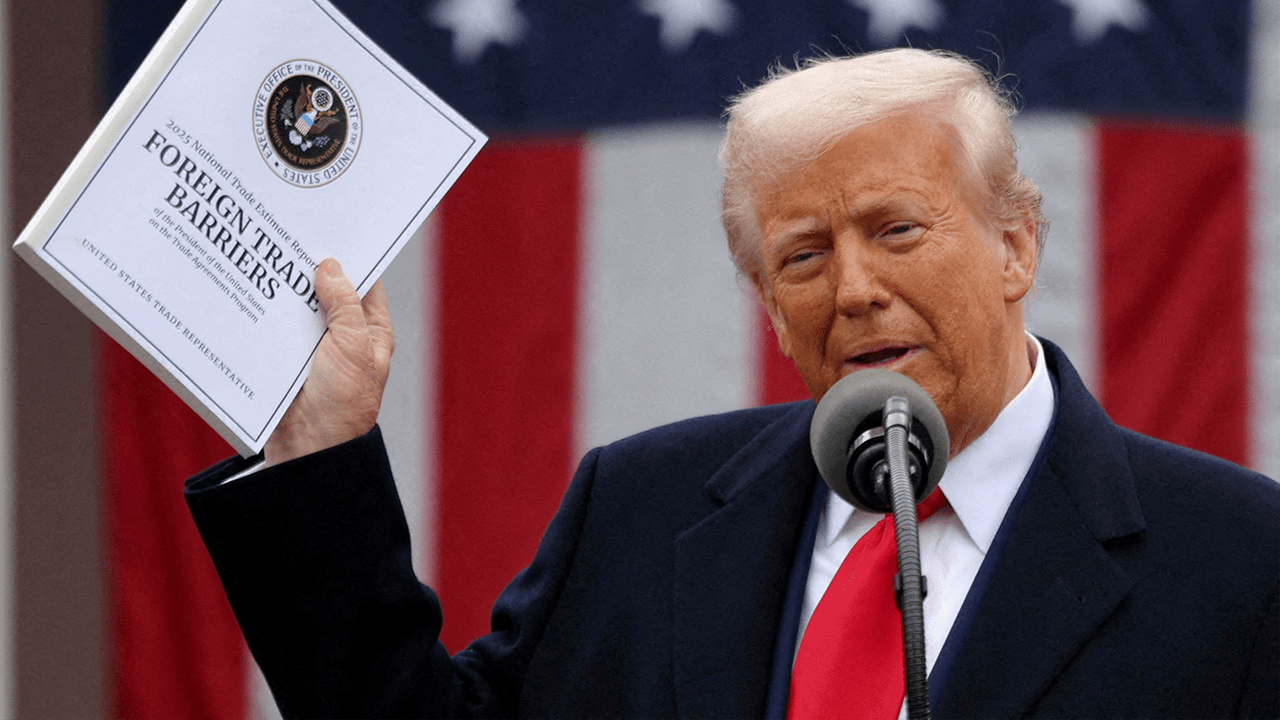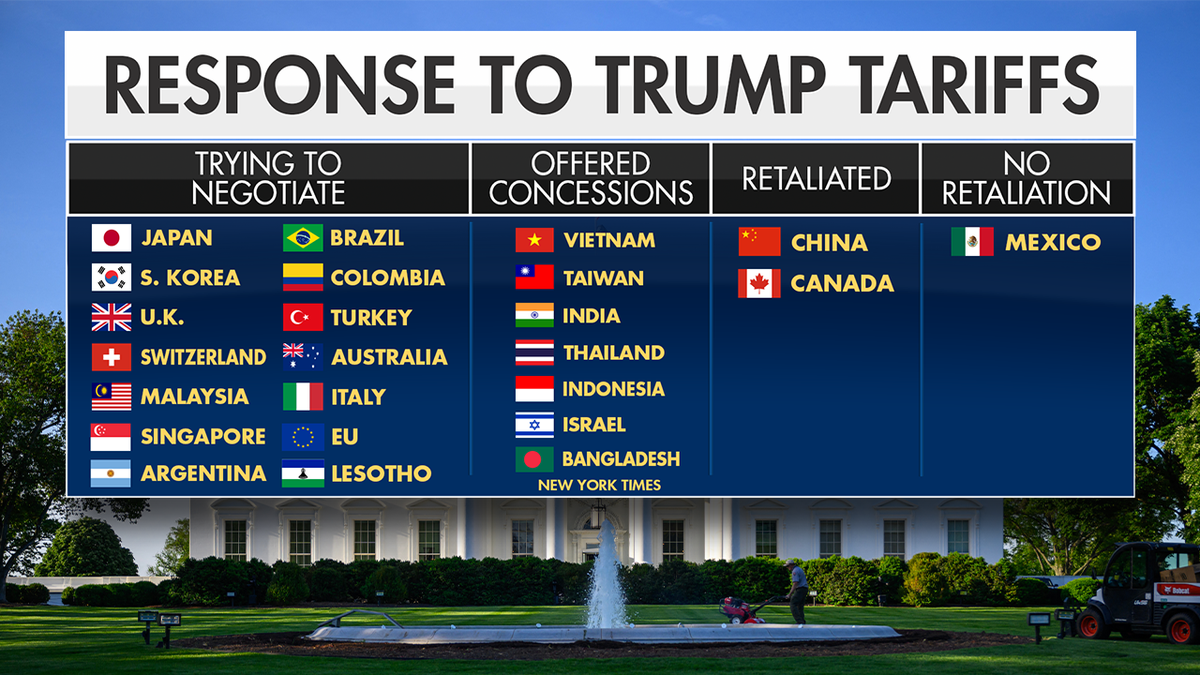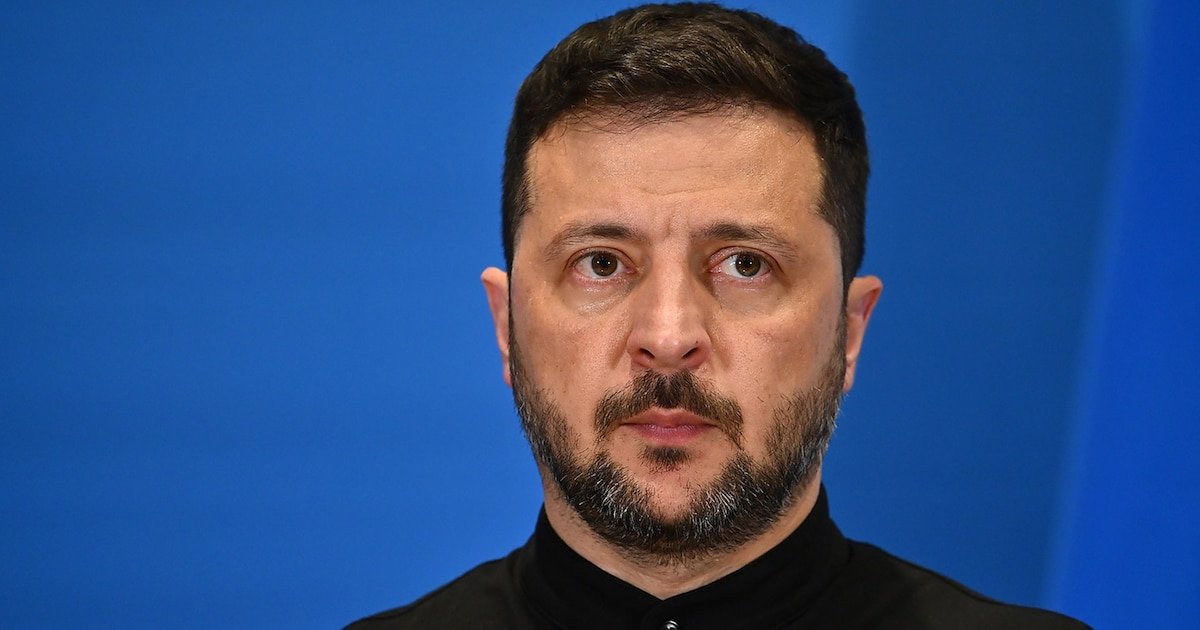INTERNACIONAL
Trump tariff plan faces uncertain future as court battles intensify

A federal appeals court paused a lower ruling blocking President Donald Trump’s sweeping tariffs, siding with the administration Thursday in a legal fight over the White House’s use of an emergency law to enact punishing import taxes.
The back-and-forth injected more volatility into markets this week after several weeks of relative calm, and court observers and economists told Fox News Digital they do not expect the dust to settle any time soon.
Here’s what to know as this litigation continues to play out.
TRUMP DENOUNCES COURT’S ‘POLITICAL’ TARIFF DECISION, CALLS ON SUPREME COURT TO ACT QUICKLY
President Donald Trump holds a chart as he delivers remarks on reciprocal tariffs during an event in the Rose Garden in Washington, D.C., April 2, 2025. (AFP via Getty Images)
What’s happening now?
The U.S. Court of Appeals for the Federal Circuit temporarily stayed a lower court ruling Thursday that blocked two of Trump’s sweeping tariffs from taking force.
The ruling paused a decision by the U.S. Court of International Trade (CIT) allowing Trump to continue to enact the 10% baseline tariff and the so-called «reciprocal tariffs» that he announced April 2 under the International Emergency Economic Powers Act, or IEEPA.
It came one day after the U.S. Court of International Trade ruled unanimously to block the tariffs.
Members of the three-judge panel who were appointed by Trump, former President Barack Obama and former President Ronald Reagan, ruled unanimously that Trump had overstepped his authority under IEEPA. They noted that, as commander in chief, Trump does not have «unbounded authority» to impose tariffs under the emergency law.
Now, lawyers for the Trump administration and the plaintiffs are tasked with complying with a fast schedule with deadlines in both courts. Plaintiffs have until 5 p.m. Monday to file their response to the Court of International Trade, according to Jeffrey Schwab, senior counsel and director of litigation of the Liberty Justice Center, which represents five small businesses that sued the administration.

A Fox News graphic shows how countries have responded to President Donald Trump’s tariffs. (Fox News; Mandel Ngan/AFP via Getty Images)
The Court of Appeals for the Federal Circuit gave plaintiffs until Thursday to file a response to the stay and the Trump administration until June 9 to file a reply, Schwab told Fox News Digital in an interview.
The goal is to move expeditiously, and lawyers for the plaintiffs told Fox News they plan to file briefs to both courts before the deadlines to mitigate harm to their clients.
«Hopefully,» Schwab said, the quick action will allow the courts to issue rulings «more quickly than they otherwise would.»
What’s at stake?
The Trump administration praised the stay as a victory.
The appellate court stay on the CIT ruling «is a positive development for America’s industries and workers,» White House spokesman Kush Desai said in a statement.
«The Trump administration remains committed to addressing our country’s national emergencies of drug trafficking and historic trade deficits with every legal authority conferred to the president in the Constitution and by Congress.»
But some economists warned that continuing to pursue the steep tariffs could backfire.
FEDERAL JUDGE BLOCKS 5 TRUMP TARIFF EXECUTIVE ORDERS

Traders work on the floor of the New York Stock Exchange March 28, 2025, in New York City. (Spencer Platt/Getty Images)
The bottom line for the Trump administration «is that they need to get back to a place [where] they are using these huge reciprocal tariffs and all of that as a negotiating tactic,» William Cline, an economist and senior fellow emeritus at the Peterson Institute for International Economics, said in an interview.
Cline noted that this had been the framework laid out earlier by Treasury Secretary Scott Bessent, who had embraced the tariffs as more of an opening salvo for future trade talks, including between the U.S. and China.
«I think the thing to keep in mind there is that Trump and Vance have this view that tariffs are beautiful because they will restore America’s Rust Belt jobs and that they’ll collect money while they’re doing it, which will contribute to fiscal growth,» said Cline, the former deputy managing director and chief economist of the Institute of International Finance.
«Those are both fantasies.»
‘AMERICAN HERO’ OR ‘FAILURE’: ELON MUSK’S DOGE DEPARTURE DIVIDES CAPITOL HILL
What happens now?
Plaintiffs and the Trump administration wait. But whether that wait is a good or bad thing depends on who is asked.
Economists noted that the longer the court process takes, the more uncertainty is injected into markets. This could slow economic growth and hurt consumers.
For the U.S. small business owners that have sued Trump over the tariffs, it could risk potentially irreparable harm.
«Some of the harm has already taken place. And the longer it goes on, the worse it is,» said Schwab.

A woman under a purple umbrella walks past the Supreme Court Feb. 28, 2024, in Washington. (AP Photo/Jacquelyn Martin)
The White House said it will take its tariff fight to the Supreme Court if necessary. But it’s unclear if the high court would choose to take up the case.
The challenge comes at a time when Trump’s relationship with the judiciary has come under increasing strain, which could make the high court wary to take on such a politically charged case.
Lawyers for the plaintiffs described the case as «very likely» to be appealed to the Supreme Court, but it’s unclear whether it will move to review it.
«It’s possible that because the case is before the Federal Circuit Court of Appeals, which essentially applies to the country, unlike specific appellate courts, which have certain districts, that the Supreme Court might be OK with whatever the Federal Circuit decides and then not take the case,» Schwab said.
For now, the burden of proof shifts to the government, which must convince the court it will suffer «irreparable harm» if the injunction remains in place, a high legal standard the Trump administration must meet.
CLICK HERE TO GET THE FOX NEWS APP
Beyond that, Schwab said, the court will weigh a balancing test. If both sides claim irreparable harm, the justices will ask, «Who is irreparably harmed more?
«And I think it’s fair to say that our clients are going to be more irreparably harmed than the United States federal government. Because our clients might not exist, and the United States federal government is certainly going to exist.»
Donald Trump,National Security,Trade,White House,Supreme Court,Politics,China
INTERNACIONAL
Zelensky reiteró a sus aliados que el armamento del ejército ruso contiene “miles de componentes” de fabricación extranjera

El presidente de Ucrania, Volodimir Zelensky, advirtió que los misiles y drones utilizados por el ejército ruso contienen “miles de componentes” de fabricación no rusa, especialmente procedentes de Europa, Estados Unidos y Japón, y pidió a estos países bloquear de manera efectiva estas cadenas de suministro.
“Todos esos misiles y drones rusos que se utilizan hoy en día contienen miles de componentes que Rusia no puede producir por sí sola. Cinco misiles Iskander-M llevan al menos 75 componentes críticos de fabricación no rusa. Tres misiles ‘Kh-101’ incluyen casi 160 componentes que Rusia no puede reemplazar por sí misma», detalló el mandatario.
A su vez, en un mensaje hacia sus aliados, remarcó: “Cada shahed (dron de fabricación iraní) tiene cientos de estos componentes exportados a Rusia desde otros países, y no solo de empresas chinas, por cierto. También de Europa, Estados Unidos y Japón”.
El mandatario instó a los aliados de Ucrania a bloquear realmente las cadenas de suministro que llevan componentes críticos a Rusia para la producción de armas, calificando esta medida de “crucial” tanto para Kiev como para la seguridad internacional.
“Las propias empresas deberían supervisar mejor el destino de sus componentes. Sin estas conexiones con el mundo, Rusia no puede hacer nada; no es capaz de ser fuerte estando completamente aislada”, aseguró.
Zelensky reiteró que “el bloqueo y la presión pueden realmente obligar al agresor a reconsiderar su política” en medio de la invasión al territorio ucraniano.
Respecto a las negociaciones en Suiza, indicó que la delegación ucraniana presentará un informe tras ronda de conversaciones en Ginebra sobre los ataques recientes en Odesa y sus consecuencias.
“El equipo debe plantear sin duda la cuestión de estos ataques, en primer lugar a la parte estadounidense, que propuso que tanto nosotros como Rusia nos abstuviéramos de atacar”, puntualizó respecto de los últimos bombardeos de Moscú a infraestructura crítica ucraniana.
El presidente subrayó que Ucrania está preparada y no necesita la guerra, y manifestó su disposición para avanzar hacia un acuerdo justo que ponga fin al conflicto bélico iniciado por Rusia en 2022. Además, adelantó que en las próximas semanas habrá nuevas negociaciones con socios internacionales y se discutirá la necesidad de que Europa produzca sus propios misiles de defensa aérea.
“La única pregunta para los rusos es: ¿qué quieren? Y también, si habrá consecuencias para Rusia por el hecho de que los shaheds, los misiles y las fantasiosas charlas sobre la historia les importan más que la diplomacia real, la diplomacia y la paz duradera»,
La jornada del martes incluyó una reunión de Ucrania con representantes de Estados Unidos, Francia, Reino Unido, Alemania, Italia y Suiza. El secretario del Consejo Nacional de Defensa ucraniano, Rustem Umerov, señaló que se coordinaron enfoques para los próximos pasos y destacó la importancia de mantener una visión común y la coordinación de acciones entre Ucrania, Estados Unidos y Europa.

Los negociadores de Ucrania y Rusia reanudarán una segunda ronda de conversaciones de paz en Ginebra este miércoles, mientras el principal enviado de Estados Unidos mostró optimismo sobre la posibilidad de poner fin al conflicto más letal en Europa desde la Segunda Guerra Mundial.
Estas conversaciones representan el esfuerzo diplomático más reciente para frenar los combates, que causaron cientos de miles de muertes, desplazado a millones de personas y devastado amplias zonas del este y sur de Ucrania.
Los delegados de Estados Unidos mantiene su presión para lograr un acuerdo que ponga fin a casi cuatro años de guerra, aunque hasta ahora no se ha alcanzado un compromiso entre Moscú y Kiev respecto al territorio en disputa.
El enviado estadounidense Steve Witkoff, representante de la administración del presidente Donald Trump, afirmó que los esfuerzos diplomáticos del mandatario impulsaron el proceso.
“El éxito del presidente Trump al unir a ambos lados de esta guerra ha generado un progreso significativo”, escribió en X. “Ambas partes acordaron actualizar a sus respectivos líderes y continuar trabajando para llegar a un acuerdo”.
(Con información de Europa Press)
Defence,Defense,Europe
INTERNACIONAL
Inside world’s top science society’s convention bashing Trump, pushing DEI, pronouns: ‘Felt like a funeral’

NEWYou can now listen to Fox News articles!
FIRST ON FOX: One of the world’s largest and most influential scientific societies held its annual conference last weekend, which a Fox News Digital review found was littered with examples of progressive messaging, criticisms of the Trump administration, and «woke» workshops.
Attendees who showed up at the American Association for the Advancement of Science (AAAS) event, held at the Phoenix Convention Center from Feb. 12-14, were immediately greeted at registration with identifier stickers that used gender pronouns such as «they/them,» «xi/xer,» «xe/xem,» and other descriptors that critics have alleged have little to do with science and biology.
During the meeting’s opening night, shortly after a 10-minute hoop dance routine from traditional Native American dancers, AAAS CEO Dr. Sudip Parikh told the audience that it’s been a «hard» and «tough year for science and scientists in this country.»
Parikh went on to blame DOGE for the «devastation» of «some of our science agencies» and the «president’s budget request» that «cut science by half» and, in his opinion, amounted to «forfeiting the future.»
DOCTORS ON KEY US HEALTH TASK FORCE ACCUSED OF PRIORITIZING DEI OVER EVIDENCE-BASED MEDICINE
The 2025 annual meeting of the American Association for the Advancement of Science. (John Tlumacki/The Boston Globe via Getty Images)
«What happened over the course of the last year is a rupture. We’re not going back, it’s not possible, too much damage has been done, too much has changed. There’s an entire generation of scientists that have a scar, a scar that is not going to go away,» Parikh explained, adding that scars can «make us tougher» and «become almost shields» that «build resilience.»
Parikh told the crowd that he warned last year that Robert F. Kennedy Jr was the «wrong person» for Health and Human Services secretary and said, «I still feel that way,» which prompted laughter and applause from the crowd.
«It’s going to take protests, it’s going to take politics, it’s going to take the ability to not speak gibberish, all of that has got to come together if we’re going to fight for the inheritance of the enlightenment to continue to make this world a better place,» Parikh said.
Workshops at the event, which provided gender-neutral washrooms, included a session titled «Mao-Mei Liu: Nurturing Diversity in Science is Resistance,» and another called «Investigating the Role of Race in Clinical Decision-Making.»
«Who Gets to Belong? Disability, Power, and Participation in Higher Education,» another workshop was called.
TOP MEDICAL SCHOOL MOVED DEI OFFICE TO SECRET LOCATION AS IT TRIES TO ‘EVADE ACCOUNTABILITY’: LEGAL GROUP

The 2026 annual AAAS conference provided guests with an all-gender washroom and gender pronoun stickers. (Fox News Digital)
Dr. Theresa A. Maldonado, a world-renowned expert in electrical engineering, delivered the president’s address at the conference and also lamented what a difficult year 2025 was for science and suggested climate change was responsible for the devastating southern California wildfires last year.
AAAS, the publisher of the highly respected Science magazine, posted several more videos over the course of the next few days, many including speakers who criticized the Trump administration and injected politics into discussions.
«Colonial Legacies, Climate Crises, and the Erosion of Mobility Choice» was another workshop that scientists at the conference were offered and in an interview with «climate justice scholar» Jola Ajibade, she explained how climate change has benefited a «few wealthy people» while «low-income communities are displaced.»
«At the center of my work is giving a voice but also bringing to the attention of everyone the impact of a slew of climate solutions, the impact of those solutions on low-income communities, on Black communities, on indigenous, on Latino communities as well,» Ajibade explained, adding that she is focused on finding a «decolonial» approach.
Listed sponsors of the event included the Science Philanthropy Alliance, a group tied to the progressive consulting behemoth Arabella Advisors through the New Venture Fund, a nonprofit that pushes a variety of progressive causes.
«The whole thing that is sad for me is that when I attended these conferences in the first Trump administration there was plenty of liberal nonsense, but it still was a celebration of science and the achievements of the year, and you left excited,» an event attendee told Fox News Digital.
«This year felt like a funeral, with nothing but griping and moaning. Why would people want to keep coming back year after year with something like that? I suspect that is why their attendance greatly suffered this year compared to the pre-COVID years. Their constant pleas to keep politics out of science are completely undercut by their perpetual whining and endorsing utter craziness. They’re happy for science to be political, as long as it’s leftist.»
Additionally, as lawmakers in the United States continue to warn about the growing threat posed by China and what they believe is the CCP’s infiltration of top institutions in the United States — particularly in the medical and science fields — the AAAS conference opted to allow the Beijing-based research institute Chinese Academy of Sciences (CAS) to operate a booth at the event.
The state-run Chinese academy, which has faced controversy over its ties to China’s government and military, has collaborated with a Chinese medical technology firm linked to a 2013 U.S. bribery case involving NIH-funded research. The company has also installed equipment in leading American research labs.
CLICK HERE TO GET THE FOX NEWS APP

Protesters are seen outside a rally held by President Donald Trump at Macomb County Community College in Warren, Michigan. (Getty Images/Dominic Gwinn)
«The AAAS says that their organization wants to ‘inspire’ future scientists and engineers, but session topics and material from their meeting actually discourage participants from relying on their effort and merit and turns the focus to race and ethnicity,» Johnathan Butcher, acting director of the Center for Education Policy at the Heritage Foundation, told Fox News Digital.
«These are the very same kind of racist ideas inspired by DEI that have been prohibited in universities, state governments, and the federal government, because the ideas violate state and federal civil rights laws,» Butcher added. «Policymakers should be aware of what this organization is doing and make sure the association is not promoting racial preferences in hiring, promotion or research awards in academia or anywhere else.»
In a statement to Fox News Digital, an AAAS spokesperson said, «A broad spectrum of the scientific enterprise attends the meeting. The topics covered were wide-ranging across scientific disciplines and are proposed by scientists. AAAS respects their First Amendment right to free speech.»
politics,science,dei
INTERNACIONAL
Ahora en Cuba hay que anotarse en una app para conseguir nafta

La empresa estatal detrás de la app cubana para sacar turnos por nafta

 POLITICA1 día ago
POLITICA1 día agoCristian Ritondo: “Vamos a apoyar la ley de modernización laboral, pero no el régimen de licencias por enfermedad”

 POLITICA3 días ago
POLITICA3 días agoUno de los jefes de la CGT adelantó que convocarán a un paro general por la reforma laboral: “Trabajaremos para que sea una gran huelga”

 POLITICA9 horas ago
POLITICA9 horas agoReforma laboral bomba: menos indemnización, más horas y despidos más fáciles — el cambio que puede sacudir el empleo en Argentina
























